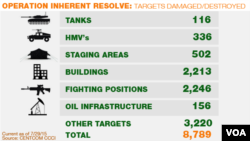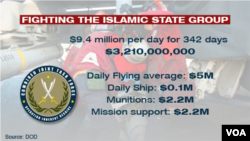On the first day of U.S. airstrikes against Islamic State (IS) last year, President Barack Obama set two goals: protect Americans in northern Iraq and help thousands of civilians trapped on Mount Sinjar after an IS offensive.
Within days, that mission broadened. The U.S., President Obama said, was no longer just protecting the displaced Yazidi community, or keeping Washington diplomats in Irbil safe. It would now “provide military assistance and advice to the Iraqi government and Kurdish forces as they battle these terrorists, so that the terrorists cannot establish a permanent safe haven.”
WATCH: One year later, Iraqi Yazidis fear death of their community
The following month, the mission again expanded, this time across the border to target IS militants in Syria.
Since then, fighter planes and drones from the U.S. and a coalition of partner countries have conducted thousands of airstrikes. By official American figures, 15,000 IS fighters have been killed or wounded.
And yet...
“Our aircraft can hit anywhere in Syria or Iraq,” says Christopher Harmer, a senior naval analyst at the Institute for the Study of War, “but we’re not really doing anything to restrain the growth of the Islamic State.”
U.S. and Iraqi military officials say that in Iraq, at least, an alliance of anti-IS forces and airstrikes have pushed the militants back. But victories like the offensive to retake Tikrit have been countered by IS gains in other parts of Iraq, and especially in a deeply fractured Syria, where the civil war that preceded the arrival of IS continues.
Islamic State-controlled territory, July 2014 to July 2015
A Syrian Kurd now living in Iraq, Ayaz Mohammed Osman, tells VOA the coalition airstrikes help the Kurdish fighters, who are on the front lines in both Syria and Iraq against IS.
“It is a very, very good step for the protection of the Kurdish people in western and eastern Kurdistan, and all of Kurdistan,” he said. “I hope these airstrikes continue to the end, and destroy all of Islamic State, and solve the problem.”
Peshmerga Staff Sgt. Dana Salahadin echoed support for the air campaign as a tool for the Kurdish militia in Iraq.
“[The airstrikes] are a great help to us, and the Peshmerga also did their part. With the help of the airstrikes against Islamic State, the Peshmerga were able to win more victories,” he said. “The Americans helped us, but we, the Peshmerga sacrificed.”
Read: 'Who joins Islamic State?'
From early in the public discussion among officials in Washington over the U.S. role against IS, the Obama administration stood firm on one point — avoiding the deployment of combat troops.
Instead, Iraqi and Kurdish militias, Iraqi security forces and Syrian rebels are the so-called “boots on the ground” bolstered by air support from the U.S. and countries in Europe and the Middle East to fight the estimated 20,000-30,000 IS militants remaining.
Read: US-Trained Rebels Captured in Syria
While IS strongholds remain in Iraq and Syria, other groups around the world have declared allegiance to the group, individuals have carried out attacks in the name of IS, and scores of suspected IS supporters have been arrested — including in anti-IS coalition countries like the U.S.
Max Abrahms, assistant professor at Northeastern University and a member of the Council on Foreign Relations, believes the violence publicized by IS will trigger the group's own destruction.
“I simply do not see how in the long term, Islamic State is going to prevail, no matter how you cut it — in terms of gaining territory, in terms of capability, manpower," he told VOA, adding “whereas Islamic State seems to be getting weaker in Iraq and in Syria, in some of these other areas where it has affiliates, it’s probably on the march.”
VOA Correspondent Sharon Behn contributed to this report from Irbil, Iraq.







